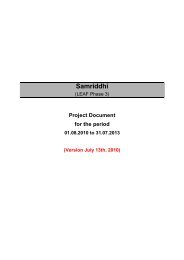Cooperation Strategy Serbia 2010 - 2013 - Deza - admin.ch
Cooperation Strategy Serbia 2010 - 2013 - Deza - admin.ch
Cooperation Strategy Serbia 2010 - 2013 - Deza - admin.ch
Create successful ePaper yourself
Turn your PDF publications into a flip-book with our unique Google optimized e-Paper software.
SERBIA <strong>2010</strong>-<strong>2013</strong><br />
palities will be targeted in the short to medium<br />
term. Complementary activities will be explored<br />
at the national level.<br />
Interventions to enhance economic governance<br />
will include support for international standards<br />
and codes aimed at a sound institutional and<br />
market infrastructure.<br />
This sub-domain is aimed at producing direct<br />
improvements to generate competitive, transparent,<br />
and reliable regulatory environments at<br />
national and local levels, thereby allowing SMEs<br />
to formalize their operations, do more and better<br />
business, and create new jobs. The regular Foreign<br />
Investments Advisory Service/International<br />
Finance Corporation (FIAS/IFC) sub-national<br />
“Doing Business” surveys in selected ben<strong>ch</strong>mark<br />
municipalities will assess progress in relevant<br />
performance indicators. These surveys are co-financed<br />
by SECO. In addition, the government’s<br />
progress in implementing strategies su<strong>ch</strong> as the<br />
“regulatory guillotine” will be a core context<br />
development to be monitored.<br />
Sub-domain: trade cooperation (SECO)<br />
<strong>Serbia</strong>’s traditional, large current account deficit<br />
calls for growth in sectors with export potential,<br />
hence an increased competitiveness of exports.<br />
To allow <strong>Serbia</strong> to capitalize on its WTO membership<br />
– expected in <strong>2010</strong> and for whi<strong>ch</strong><br />
SECO’s support has been essential – trade-related<br />
deficiencies and opportunities are being<br />
addressed to increase the export potential of private<br />
enterprises. Main lines of intervention are (i)<br />
intellectual property rights through the enforcement<br />
of geographical indications (GIs); these are<br />
related to WTO-TRIPS and intended to designate<br />
product quality, highlight brand identity and preserve<br />
cultural traditions; (ii) the European retailers’<br />
programme for good agricultural products<br />
(GLOBALGAP) quality standard for export-oriented<br />
commercial agriculture; and (iii) export promotion<br />
for specific traditional agricultural products<br />
(in cooperation with SIPPO), as well as commodities<br />
and services with a high te<strong>ch</strong>nological<br />
value (development of specific export clusters).<br />
Expected outcomes are directly related to these<br />
activity lines. Exports by commercial entities<br />
whi<strong>ch</strong> introduce GIs and quality standards should<br />
increase measurably. The wider context must be<br />
monitored in terms of government policies and<br />
regulations that impact on the export industry.<br />
Sub-domain: making markets work for<br />
the poor/M4P (SDC)<br />
A systemic SME-focused market development<br />
approa<strong>ch</strong> is relatively new to <strong>Serbia</strong>. Consequently,<br />
the potential for alignment with existing<br />
policies and strategies is limited. SDC has<br />
begun rolling out the innovative “Making Markets<br />
Work for the Poor” (“M4P”) concept, whi<strong>ch</strong><br />
intends to develop market systems so that they<br />
function more effectively and, in particular, also<br />
9

















